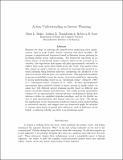Action understanding as inverse planning
Author(s)
Baker, Christopher Lawrence; Saxe, Rebecca R.; Tenenbaum, Joshua B.
DownloadSaxe_Action understanding.pdf (531.9Kb)
OPEN_ACCESS_POLICY
Open Access Policy
Creative Commons Attribution-Noncommercial-Share Alike
Terms of use
Metadata
Show full item recordAbstract
Humans are adept at inferring the mental states underlying other agents’ actions, such as goals, beliefs, desires, emotions and other thoughts. We propose a computational framework based on Bayesian inverse planning for modeling human action understanding. The framework represents an intuitive theory of intentional agents’ behavior based on the principle of rationality: the expectation that agents will plan approximately rationally to achieve their goals, given their beliefs about the world. The mental states that caused an agent’s behavior are inferred by inverting this model of rational planning using Bayesian inference, integrating the likelihood of the observed actions with the prior over mental states. This approach formalizes in precise probabilistic terms the essence of previous qualitative approaches to action understanding based on an “intentional stance” [Dennett, D. C. (1987). The intentional stance. Cambridge, MA: MIT Press] or a “teleological stance” [Gergely, G., Nádasdy, Z., Csibra, G., & Biró, S. (1995). Taking the intentional stance at 12 months of age. Cognition, 56, 165–193]. In three psychophysical experiments using animated stimuli of agents moving in simple mazes, we assess how well different inverse planning models based on different goal priors can predict human goal inferences. The results provide quantitative evidence for an approximately rational inference mechanism in human goal inference within our simplified stimulus paradigm, and for the flexible nature of goal representations that human observers can adopt. We discuss the implications of our experimental results for human action understanding in real-world contexts, and suggest how our framework might be extended to capture other kinds of mental state inferences, such as inferences about beliefs, or inferring whether an entity is an intentional agent.
Date issued
2009-07Department
Massachusetts Institute of Technology. Department of Brain and Cognitive SciencesJournal
Cognition
Publisher
Elsevier
Citation
Baker, Chris L., Rebecca Saxe, and Joshua B. Tenenbaum. “Action understanding as inverse planning.” Cognition 113.3 (2009): 329-349.
Version: Author's final manuscript
ISSN
0010-0277